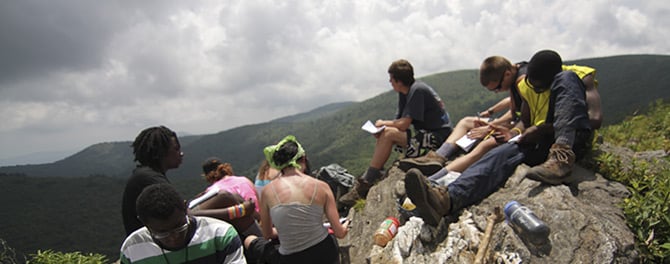Experiential Learning in the Backcountry: a Balance of Fun, Learning, Self-Development
Experiential EducationWe live in a world increasingly dominated by social media, virtual reality, and artificial intelligence. So, when it comes to backcountry and wilderness expeditions, participants of all ages have an opportunity to learn and grow in fun, challenging real-world settings.
Whether navigating rugged terrain, setting up a tent, or preparing a meal without the aid of modern appliances, participants in guided outdoor adventures are required to think critically, adapt quickly, reflect deeply, and collaborate closely with others. In this post, I explore how backcountry adventures serve as powerful catalysts for personal growth, leadership development, and environmental awareness.

Here at The National Center for Outdoor Adventure and Education (NCOAE), we offer guided outdoor expeditions that focus on creating profoundly empowering experiences for everyone involved. In the backdrop of a wilderness setting, we encourage participants —students on a summer teen leadership expedition or adults on one of our 21-day adult leadership expeditions — to challenge themselves to grow and expand upon their critical thinking, teamwork, and technical outdoor skills.
Most of our first-time participants have little to no experience in the backcountry, and that’s why our objective is not to turn them into avid backpackers, rock climbers, or paddlers. While our adventures often spark a new passion for these activities, our goal is to use the backcountry as a classroom that facilitates learning and personal or professional growth.
Outdoor and adventure-based experiential education in the backcountry enables our course participants to learn, grow, and build self-confidence. And they do this by: (more…)
Backcountry Gourmet — Favorite Recipes from Our Field Staff
Wilderness CookingHere at The National Center for Outdoor & Adventure Education (NCOAE) we like to take backcountry cooking to the next level, and that means teaching students how to prepare gourmet meals while on backcountry expeditions.
Whether it’s starting your day with a hearty breakfast, making a quick lunch wrap on the run, or preparing a veggie-filled dinner at the end of a long day hike, climb, or paddle, this post includes three backcountry recipes that might inspire you for the meals you’ll prepare and enjoy on your next adventure.
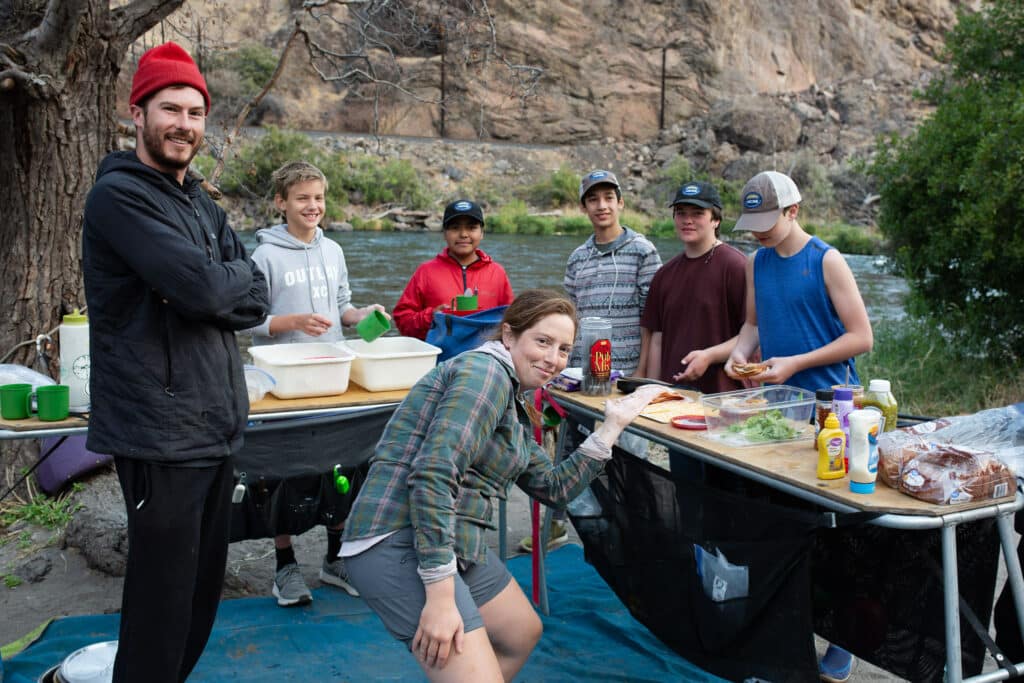
Cooking in the backcountry doesn’t mean you have to sacrifice flavor or nutrition. In fact, with a little planning and creativity you can enjoy delicious, nutritious, and satisfying meals that fuel your human-powered outdoor activities. Our field instructors have crafted these recipes to be both easy to prepare and incredibly tasty, ensuring that your time in the backcountry is complemented by great food.
Heard, Chef! When you’re in the wild, having a variety of meals that are quick and simple to prepare can make a big difference in your attitude and overall experience. The three recipes below are designed to maximize flavor while minimizing cooking time and cleanup, allowing you to spend more time enjoying the great outdoors.
At NCOAE, we believe that good food is an essential part — in fact, a highlight — of any outdoor adventure. Not only does it provide the energy needed for strenuous activities, but it also brings people together, creating memorable experiences around the campfire. So, whether you’re a seasoned outdoor chef or a beginner, give these recipes a try.
Note: The following recipes are meant for groups of 12. Do the math and adjust for the size of the group for whom you’re cooking.
Backcountry Recipe 1 – Breakfast
Breakfast Burritos with Hash Browns
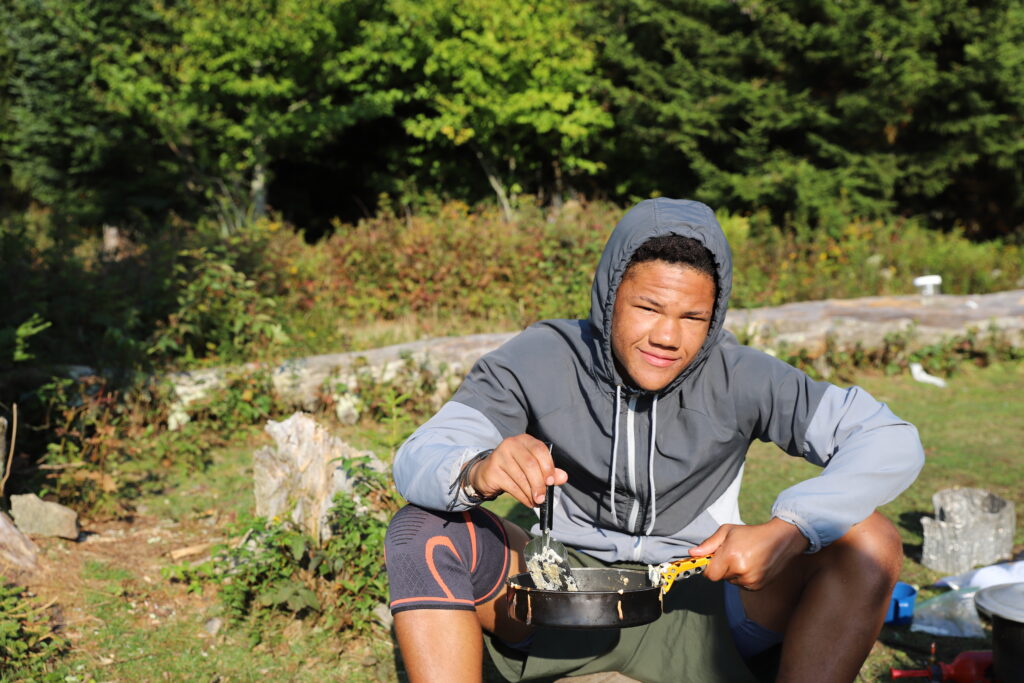
Ingredients
- 3 Cups Scrambled Egg powder or 24 Eggs
- 4 Cups Hashbrowns (dried)
- Onion, diced
- Bell Pepper, diced
- 12 Tortillas
- 1 Cup Salsa
- 2 Cups Cheese
- Salt & Pepper, to taste
- Bacon Bits, optional
- Ketchup packets, optional
- Butter / oil
Directions | Instructions | Serves 12 (more…)
Advice: Starting an Outdoor Education or Adventure Program in Your School
Outdoor EducationIn addition to working for The National Center for Outdoor & Adventure Education (NCOAE), I’ve had the good fortune to assist public, private, and charter schools in setting up outdoor education programs for the past 25 years. During that time, I’ve developed a few winning strategies for educators embarking on such adventures.
Some of my more successful programs have included launching a learning farm for a public school system with 32,000 students, transforming schools into outdoor learning labs as a model for a school district, and even helping former inmates return to the world beyond bars by diving deep into outdoor experiences. (You can learn more about some my school-related work by reading “Taking Learning Outdoors: Merrick-Moore Elementary” on The Great Trails State Coalition website.)
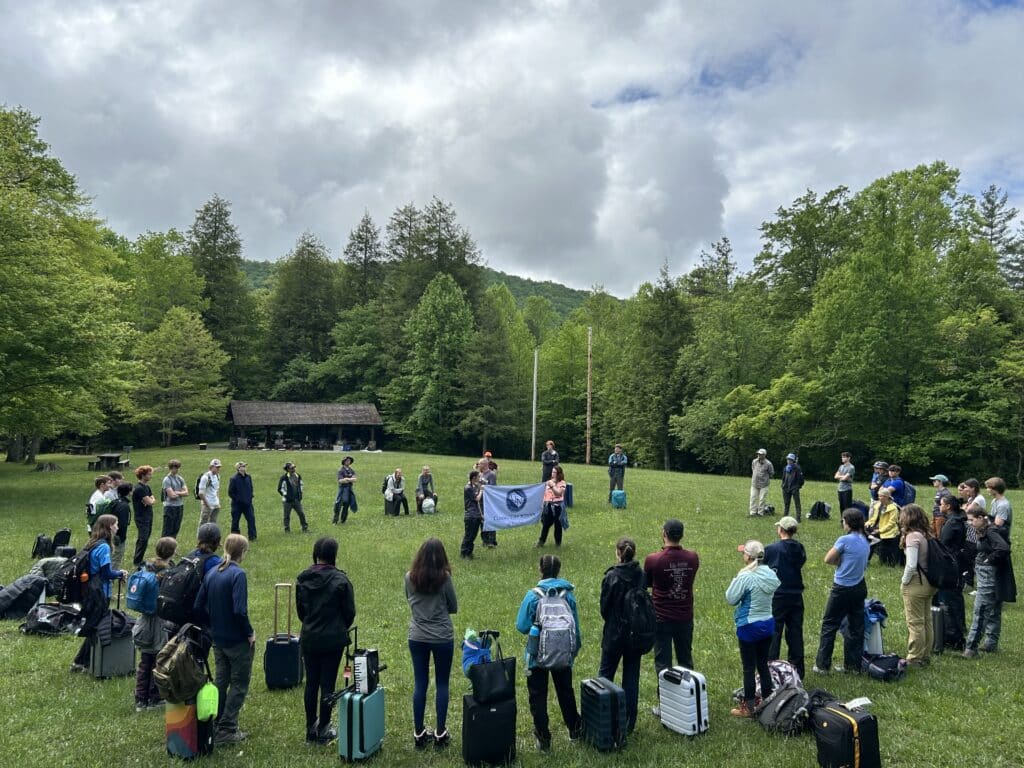
None of these projects were easy, but they can be done. In this post, I offer insights on how to start an outdoor education or adventure program for your classroom or school. Let’s begin with planning and dreaming.
Have a Dream, Plan Your Work, and Work Your Plan
To successfully launch an outdoor education program, it’s important to start with a clear vision and follow a structured plan. Here’s an approach I’ve developed based on both my experiences and the wisdom of my mentors (more…)
Avoiding Target Fixations and Incident Pits in the Backcountry
Risk Management“Look where you want to go!”
I have conveyed this message to wilderness course participants countless times, shouting, screaming, and using hand signals when necessary. Sometimes I’m yelling above the roar of a set of rapids or the sound of an adjacent waterfall.
“Look where you want to go!”
I emphatically issue the same advice while watching climbers rappelling down a cliff, or verbally guiding a student on a mountain bike through a sketchy section of trail. In each case, the point of my shouting is to get the students to stop looking at the obstacle.
“Look where you want to go” really translates as “Stop looking at the obstacle! Don’t fixate on the hazard!”
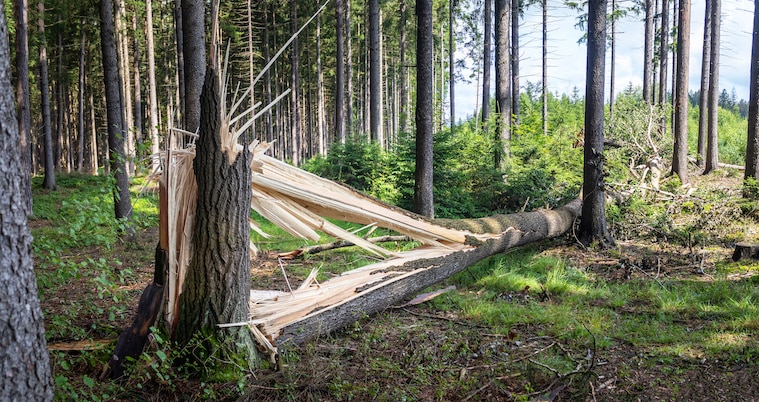
And it doesn’t matter if you’re a Wilderness First Responder approaching the scene of a backcountry incident, or a student on a wilderness course attempting to navigate a perceived hazard or obstacle, looking too closely at a hazard you want to avoid can be very dangerous.
At first glance — no pun intended — you might think it wise to actually look closely at the hazard you want to avoid. No argument there. You absolutely need to identify obstacles, especially in the backcountry and other places considered Wilderness. In fact, identifying an obstacle is a key factor in remaining safe.
But here’s the thing: (more…)
When it Comes to Wilderness, Is it an Adventure or Experience?
Outdoor EducationYears ago, I was working in wilderness-based setting with a group of gang members who were attempting to break away from the often-violent lifestyle in which they found themselves. During a break our programming, I asked a loaded question.
“Anybody want to tell me about their tattoos and what they mean?”
The 30 or so gang members, hailing from a variety of organizations — MS-13, Bloods, Crips and Latin Kings — stared up at me. Hard. One participant in the back shouted, “Nobody gives a shit about our tattoos!”
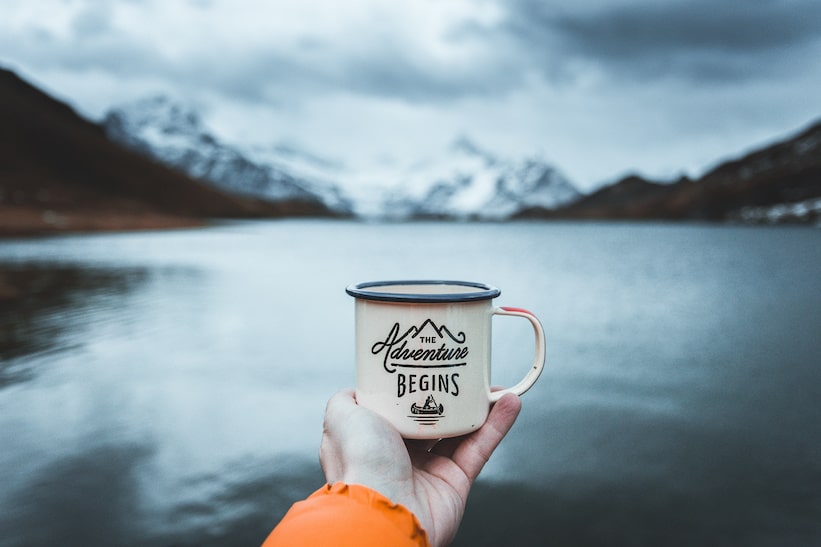
When I burst out laughing, I was met with even harder stares, I realized an explanation was in order. I told the participants that everyone wants to know about their tattoos. They’re just too afraid to broach the subject.
I said that if we were to put a person covered in tattoos from head to toe on a scale, and then somehow remove all that ink on their skin and weighed them again, the weight change would probably be undeterminable.
If, however, that same tattooed gang member walked into a job interview, the weight of those tattoos — what they represented — would be a thousand pounds. So again, I asked them to tell me the stories and histories behind their tattoos. What followed was an enlightening experience. The curtain was pulled back and these folks opened up and shared the significance behind their body art.
My point is this: Words and images have weight.
Words and Images Have Weight
I tell you this because a leading outdoor industry retailer — REI (Recreational Equipment, Inc.) — recently announced an adjustment to their marketing, based on patterns they say are cropping up in our culture today. REI’s announcement that the company is rebranding its tour business from REI Adventures to REI Experiences caught many people I know off guard, myself included.
It’s an effort, they say, to increase their participant base to three million clients a year. The company’s officers and administrators fear the word “Adventure” is getting in the way of its effort to grow the business.
So, what is it we think when a brand that builds a $3.7-billion-a-year business around catering to adventurers decides to change the word to experiences instead? Is adventure too heavy of a word? Is the term adventure dangerous? Are we — both consumers and outdoor community members — becoming soft?
What comes next? Will the (more…)
Applying the Principles of ‘Leave No Trace’ to Daily Life in an Urban Setting
UncategorizedWhat is Leave No Trace?
The idea behind Leave No Trace is to embrace specific wilderness stewardship values in order to protect our backcountry areas for generations to come. Back in the early 1940s, Robert Baden-Powell, founder of the world Scouting movement, said, “Try and leave the world a little better than you found it.” Over time, this morphed into, “Always leave your campground cleaner than you found it.”
Fifty years later, in the early 1990s, that Leave No Trace concept was immortalized through an educational curriculum developed by the United States Forest Services in partnership with NOLS (the National Outdoor Leadership School). The outcome was an agreed framework for instilling awareness on the part of wilderness travelers to interact with nature in a manner that reduces human impact.
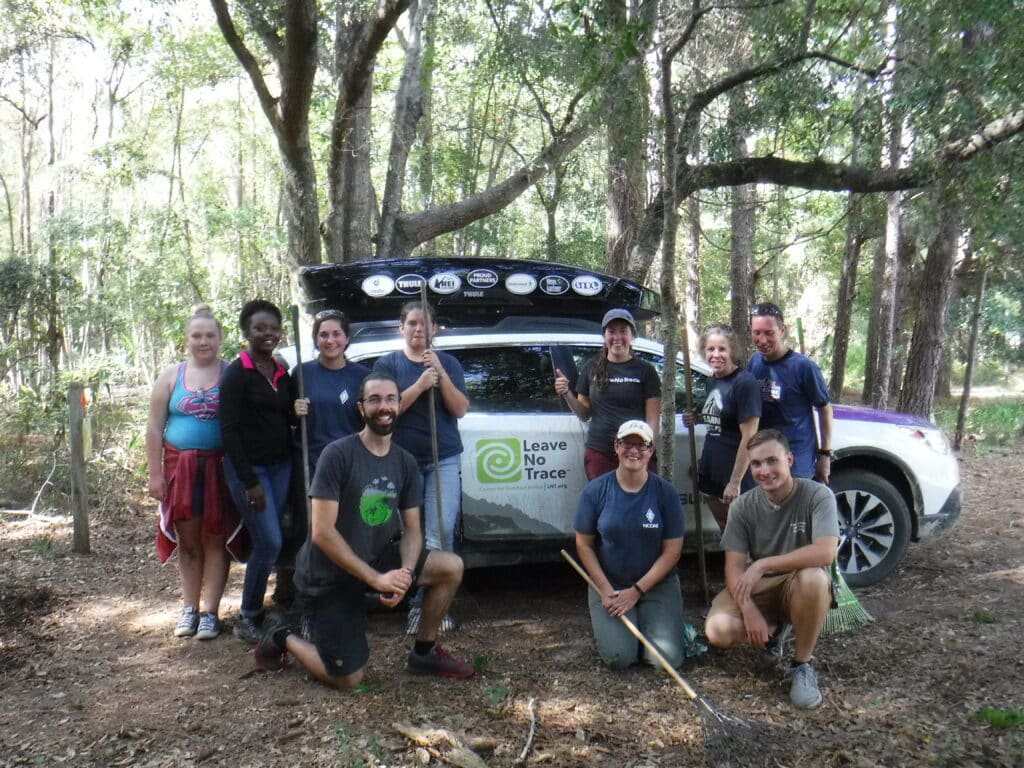
What is The Importance of Leave No Trace?
The idea behind Leave No Trace is to embrace specific wilderness stewardship values in order to protect our backcountry areas for generations to come. Today, that program — run by the Leave No Trace Center for Outdoor Ethics in Boulder, Colorado — impacts more than 15 million people in the United States and dozens of other countries with conservation initiatives, education, training, and research.
Baden-Powell’s simple sentiment more-or-less condenses the seven principles behind today’s Leave No Trace (LNT) program. The well-known LNT’s principles are: (more…)
There’s a Reason Why Outdoor Ed is Not Club Med
Outdoor EducationZac Adair, our co-founder and executive director, recently asked one of our course
participants why they signed up for a particular outdoor adventure. “It was a photo that
appeared on your website of a guy on top of a mountaintop with the blue skies above the
glaciers in the background.”
Picture yourself here. It’s a common tactic in all great marketing campaigns. If after
seeing an advertisement, you can picture yourself wearing a specific shirt, driving a
particular truck, or vacationing on a cruise ship that’s making its way to the Bahamas,
then the team of marketers responsible for those ads has done their job.
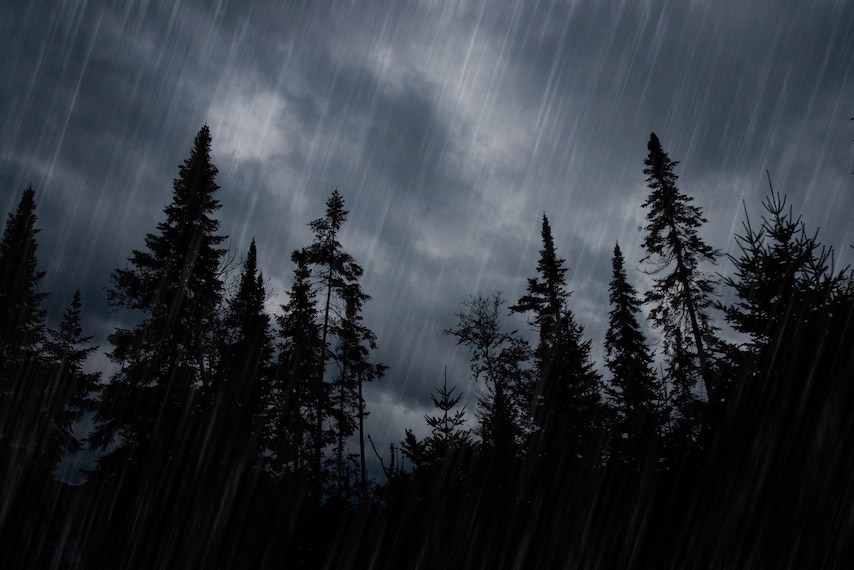
Here at The National Center for Outdoor & Adventure Education — where we’re focused
on designing and guiding outdoor and adventure education experiences that promote
personal growth, professional development, and stewardship in our community and the
natural environment — we employ the same tactics. Take one look at our website and
you’ll see photographs and videos featuring real NCOAE students participating in the
very courses and trainings that we offer around the globe.
So, it’s little wonder that these videos and photos prompt our website visitors to picture
themselves on one of our backcountry adventures. But here’s the thing that may escape
such a casual or initial thought. That picture of a (more…)
Cape Fear Academy Students Immerse Themselves in Ecuador’s Culture
International ExpeditionsLate last year, the staff at Cape Fear Academy in Wilmington, North Carolina, asked for our help in creating a unique and meaningful 10-day, outdoor and adventure-based out-of-country expedition for a handful of its high school students.
In particular, Cape Fear’s educational leaders were looking for a diverse destination that would enable their students to immerse themselves deeply in a new culture — an adventure that would extend far beyond selfies, social media, suntan oil, and sand — and which would reinforce the school’s own values and curriculum. Known for designing and leading custom outdoor education programs for private and independent schools, we were happy to help!
The original Cape Fear Academy was established in 1868 as an independent school for boys. After closing in 1916, the school was reestablished 52 years later in 1968 with the commitment of “forging capable young adults with skills, confidence and resilience to take risks, solve problems and overcome challenges.”
So, it was with that focus in mind that the school asked us here at The National Center for Outdoor and Adventure Education (NCOAE) to custom design an expedition for nine of the school’s students, along with a chaperone from the school and three NCOAE field instructors. Their destination? Ecuador.
Our staff prepared an itinerary that incorporated the school’s objectives of instilling confidence, facing challenges, taking on informed risks, and solving problems. After all, those missives mirror the (more…)
Mark Udall on Outdoor Education and Politics
Outdoor Education News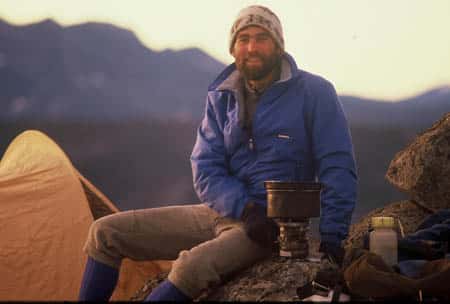 To those of us who have worked in the outdoor education field for 20 years or more — or who know the history of our practice and its people — the name Mark Udall rings a familiar sounding bell. Most people nowadays know Mark Udall as the senior U.S. Senator from Colorado whose family’s role in politics, especially in the western part of the United States, spans over 100 years.
To those of us who have worked in the outdoor education field for 20 years or more — or who know the history of our practice and its people — the name Mark Udall rings a familiar sounding bell. Most people nowadays know Mark Udall as the senior U.S. Senator from Colorado whose family’s role in politics, especially in the western part of the United States, spans over 100 years.
But upon closer inspection, it’s not very difficult to tell that Udall is one of us, or said different, that that he used to be one of us and not in some slightly insignificant way. That’s because right there on his Wikipedia entry, Mark Udall lists Outward Bound instructor as his primary job title. We don’t know about you but we think that’s pretty cool and refreshing to see, especially when almost 50% of the members of Congress list “lawyer” as their occupation.
Why point this out? Because Rock & Ice magazine recently ran a profile of Udall in which the 6-foot 5-inch uber legislator calls our attention to the significant role outdoor education can play in our lives. You see, Udall used to run the Colorado Outward Bound School — as in, he was its executive director during one of the organization’s largest growth spurts — and now he’s one of the most powerful and influential people in the United States.
Have a look at what Mark Udall has to say about what he’s learned along the way, and how his career in outdoor education has helped make him the person he is today: (more…)
The Importance Of Self At NCOAE
About NCOAEWe have a formula here at the National Center for Outdoor & Adventure Education (NCOAE) and it reads like this: Self + Community + Action = Impact.
In fact, self is the backbone of what we do at NCOAE. It involves our esteem, self-actualization and the decisions we choose to make — all of which are important because we strive to establish a strong sense of esteem in everyone who participates in one of our outdoor education courses.
No matter what the outdoor activity, we provide course participants with countless opportunities to build and reinforce self-confidence. Take backpacking, for example. Here is an opportunity to look back on the trail and say, “I did this. It is an enormous feat in autonomy.” The same holds true for course participants who navigate whitewater for the first time in a raft, or scale up a vertical rock face, or successfully tuck into a tight tube on a surfboard.
Any of these human-powered outdoor activities, when approached with confidence and a good attitude, can’t help but establish a strong sense of self. And getting to know yourself and your limits — actually understanding what it takes to battle through discomfort and arrive successfully at the other end — is a priceless commodity.
Going solo in the wilderness in a controlled scenario is another example that sets you up for successfully establishing a good relationship with yourself that can last a lifetime. Assisted by journal writings, Educational Groups and evening Process Groups, our course participants learn to (more…)
TALK TO US
Have any further questions about our courses, what you’ll learn, or what else to expect? Contact us, we’re here to help!
